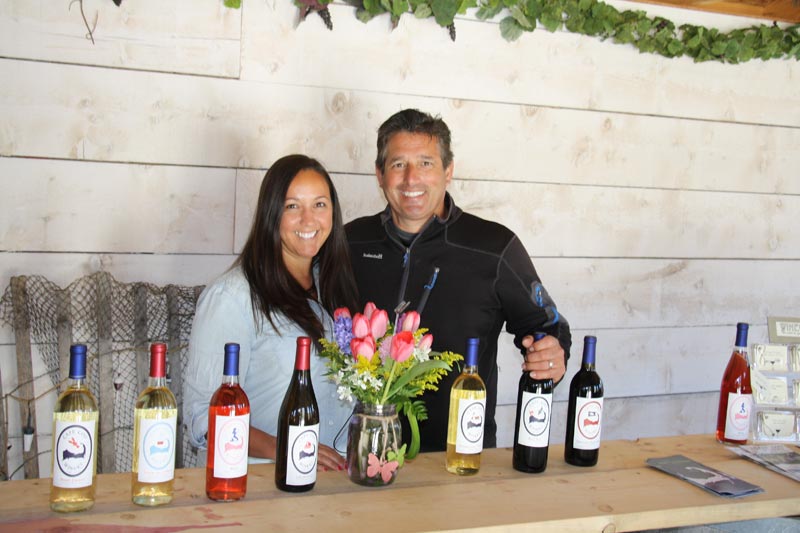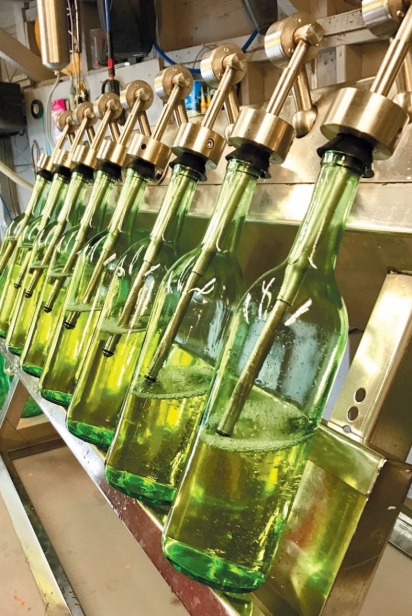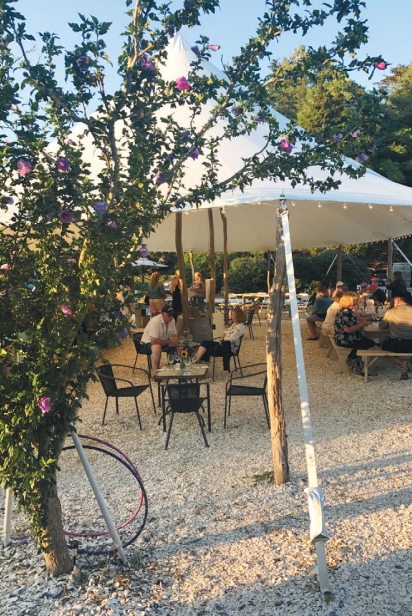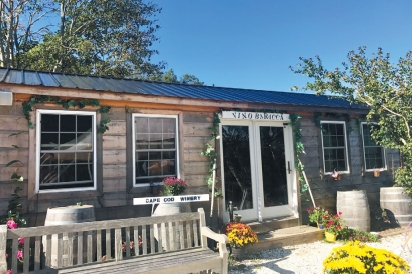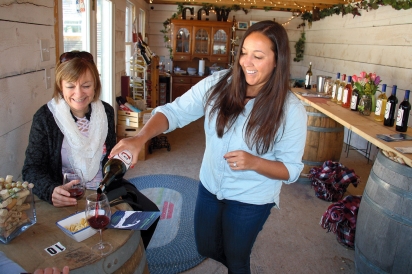Thriving on the Vine
In 1994, Tony and Kristina Lazzari leased a plot of land along Sandwich Road in Falmouth, planted rows and rows of grape vines over the undulating landscape and established Cape Cod Winery. Nearly 20 years on, the winds of change began to freshen. The couple looked for a suitable person (or persons) to take the reins of the vineyard and carry on the winemaking tradition. In Erika and Peter Orlandella they found a young couple brimming with energy and enthusiasm and looking for a business opportunity that would allow them to relocate to Cape Cod from Waltham.
Not that the Orlandellas would be swayed right away by their own excitement, however. In what would become a pattern in their business dealings going forward, Erika and Peter were deliberate in researching and learning about the wine business before taking the leap and becoming vintners. “We worked with them [the Lazzaris] for over a year before jumping in,” Erika recalls. “They were great and we could call on them with any questions we would have…and we still can!” she laughs.
The jump took place in 2013, and it wasn’t long before the new owners knew they’d be looking for a new tract of land to call Cape Cod Winery’s home. The Orlandellas had purchased the business, but the 11 acres on which it sat was leased. “The property owner had told us they were looking to sell, so we knew we had to find somewhere else,” Erika said. The results of the search didn’t have them moving far, and, in late 2014, the Orlandellas purchased three acres on the corner on Oxbow and Brick Kiln Roads in Falmouth. The land was once home to a multi-generational family farm that had grown apples, strawberries and even grapes. Not that it was a turnkey situation. Trees and underbrush had reclaimed the property, and the 1800s farmhouse had been sitting idle for a number of years.
The rehabbing of the house and fields began in earnest the following year. The trees were cut down, the stumps pulled from the ground, and rows of vines were planted across the field that gently slopes away from the house. Some of the vines were transplanted from the old location, but most were purchased from nurseries in upstate New York (white) and California (red). There is a total of seven different varietals growing on site at the winery: Vidal Blanc, Seyval Blanc, Chardonnay, Pinot Grigio, Cabernet Sauvignon, Cabernet Franc and Merlot. The farmhouse itself underwent an extensive remodel that would prove to be key for the winery’s operation.
“Whether we wanted to or not, we opened our doors to the new location in 2016,” Erika chuckles. “People would stop by for tastings, so we’d end up hosting them right in here,” she adds, standing in their beautifully renovated kitchen complete with a farmhouse sink.
If 2016 was Cape Cod Winery’s soft opening, then 2017 stepped things up for the couple. “Last year was really the first year that it felt like we were truly in business here,” Erika says. The vines started to fruit, albeit on a small scale. Erika and Peter augment what they grow on site with grapes brought in from other areas of Massachusetts as well as California. “It helps with the consistency of the product,” she explains. It also helps supplement what is grown at the winery. At three acres, there’s only so much wine that can be produced. As the vines mature, the yield expands. Last year’s crop, at 5500 gallons, more than doubled the previous year’s mark.
The harvest begins in September with the grapes for the white wines. The reds are taken in October and that’s where things can get a bit uncertain, as the Orlandellas play that age-old game of chicken with Jack Frost that all farmers participate in. Namely, the longer you can leave the fruit on the vine, the better the resulting grape, as it builds up the all-important sugar content. The longer the fruit stays out there, however, the chances of getting hit by a killing frost only increase. Whoever said that farming isn’t a high wire act hasn’t tried to earn a living at it.
After the grapes are harvested, the process is to press the grapes, ferment and cask them at the winery. Once in the steel or oak aging barrels (depending on the varietal), the wine is placed in a temperature-controlled storage facility across town where they will age anywhere from three months to nearly two years.
A small army of friends and family muster back at the winery to help in the bottling process and to do battle against the finicky labeling machine. “It’ll be going along fine, and it really helps,” Erika explains. “But sometimes it’ll just go crazy and put seven labels on one bottle!” Those are the wines that end up staying at the winery to be used in the tastings. The properly labeled bottles (complete with the winery’s motto: “La Bonne Vie” meaning “The Good Life”) can be found in liquor stores across Cape Cod.
Whether it’s the Vineyard Sound Sauvignon Blanc (Erika’s favorite), the Rose Mermaid Water (the most popular), the Reel Red, the new Nantucket Sound Red Sangiovese or any of the other varietals Cape Cod Winery offers, they are meant to be enjoyed right away. Cape Cod Winery does not add sulfites to their wine. Sulfites act as a preservative because of their antioxidant and antibacterial properties. As Erika explains, “These aren’t the types of wines that you keep and let age.”
The list of wines produced includes a blueberry wine with Maine blueberries and a cranberry wine with berries supplied by Decas Cranberry in Carver. The popularity of the cranberry wine caught the Orlandellas a bit by surprise. The specialty wine sold out in early November last year in the run up to Thanksgiving. Last year’s increased harvest should help with the demand come fall as the berries are blended with grapes to balance out both the sweetness (blueberry) and tartness (cranberry) within the wines.
At Cape Cod Winery, Erika and Peter strive to make the occasion as wonderful as the wine. “We listen to our customers,” she points out. “They prefer a slower experience.” Guests are encouraged to linger while they sample. With an eclectic array of tables, chairs and benches, there are almost as many different choices of seating as there are wines to taste. The wait times did begin to creep up during the busy summer days last year as the Orlandellas tried to keep up with demand and not rush people through their experience. As a result 2018 will be the year when the expansion of operations is in the form of staff. The couple plans to hire ten people to help with the tastings as well as with the ever-growing list of events being held at the winery.
Erika and Peter made a successful appeal to the town licensing board earlier this year to be allowed to pour full glasses of wine and not just tasting sizes. “That’s huge for us. It’s a game changer,” Erika declares. In hindsight, she considers it a good thing that they could only pour tastings until now. As the winery continues to establish itself in its new location, she rationalizes, “It was a forced slow growth.”
A large tent supported by gnarled locust tree limbs makes events, like birthday or retirement parties, or fundraisers for local organizations like the Falmouth Fireworks committee or Falmouth dog park, more enjoyable and weather protected. Weddings are also gaining in popularity at the winery. “It’s a great spot for people who are looking for a low key, rustic setting for their wedding,” Erika says. “We can accommodate groups of up to 75 people.”
Food offerings to this point have been limited to simple cheese plates arranged by Erika. Moving forward, the Orlandellas are looking to locally source more food options to offer their guests. The preserves for the cheese plates are already supplied by Peachtree Circle Farm in West Falmouth. The jams have been so popular that jars are available for purchase as well. They’re also looking to The West Falmouth Cheese Shop to expand the line of cheeses and a local oyster farmer to provide those little gems of the sea. For heartier fare, the idea is to have a local food truck operator set up shop on the crushed shell parking area of the winery. Local musicians will add the perfect soundtrack to lovely Friday evenings at the winery as well. “It’s a really great sense of community,” Erika expresses.
That sense of community extends to the other businesses within the winemaking society. The owners of Westport Rivers Winery reached out to the Orlandellas who took them up on their offer of the trellis wires and irrigation hoses that Westport was replacing. The majority of vintners belong to the Massachusetts Farm Wineries and Growers Association, where members gather to discuss their trade and make connections for support and assistance when needed. The member wineries have worked together to open a wine shop in the Boston Public Market in the city to sell and promote the wine, mead and hard cider produced in Massachusetts. Cape Cod Winery is also a stop on the Cape Cod Craft Beverage Trail, which highlights the distilleries, breweries and wineries that continue to thrive and expand across this bar of sips and sands.
Some businesses grow like weeds—fast, unsustainable growth that affords them a small window of peak performance before the inescapable decline begins all too soon. Cape Cod Winery is akin to the vines to which they tend. An enterprise slowly building a sturdy root system that allows it to survive the dales that are inevitable within the business and growing cycles, methodically increasing their output in a controlled and sustainable manner. Erika and Peter Orlandella continue to expand their space and offerings. An extended outdoor tasting area under a pergola is the project for 2018, and building a storage facility on-site is on the board for next year. Their vision spans the next several years, and at every step of the way we’re invited to stop by, relax and have a taste of the good life.
Cape Cod Winery
4 Oxbow Road, East Falmouth
508-457-5592 / capecodwinery.com
Spring/Summer Tasting Schedule
May: Weekends only
Memorial Day through June: Thursday-Sunday
July/August: 7 days a week


